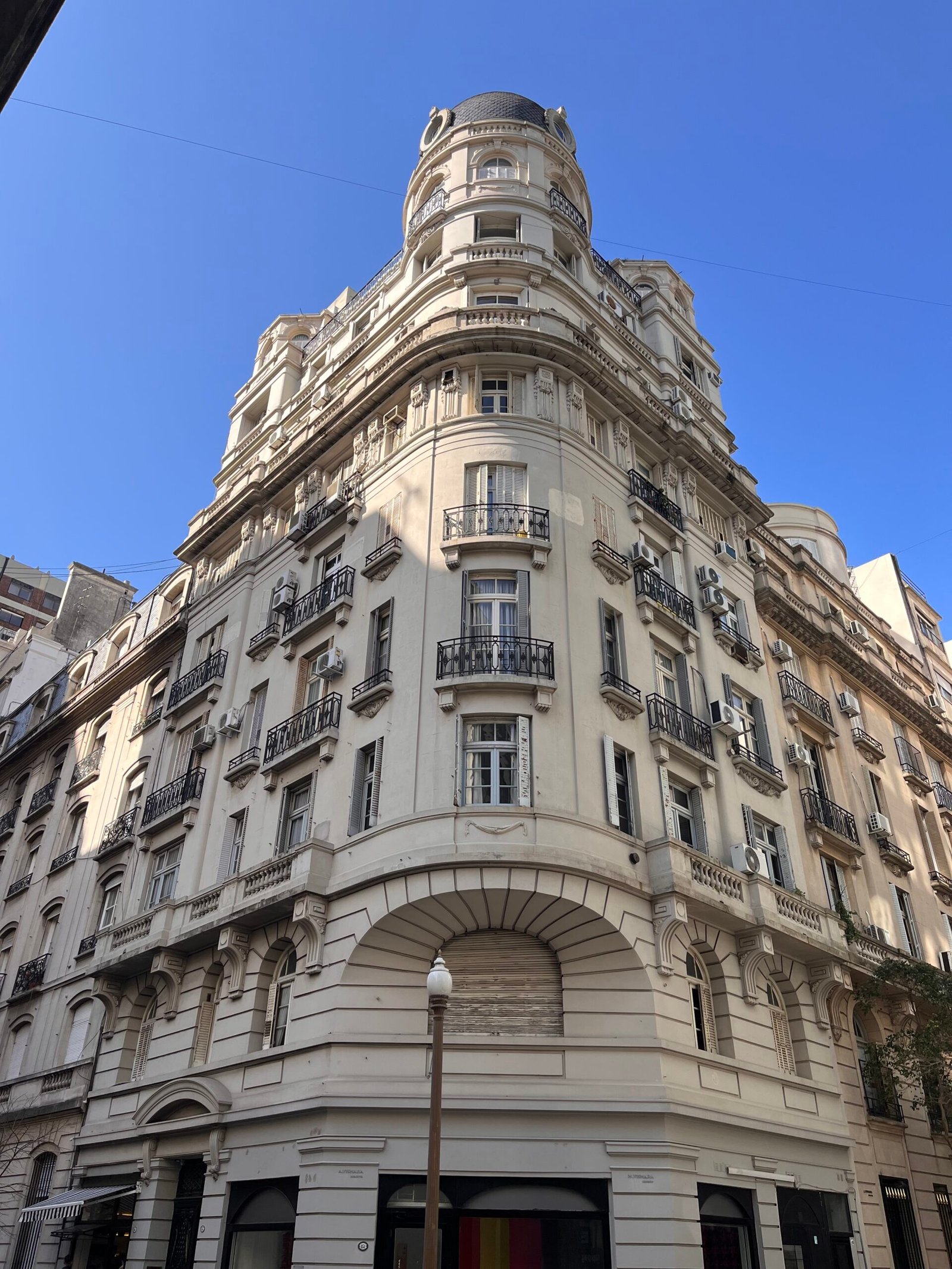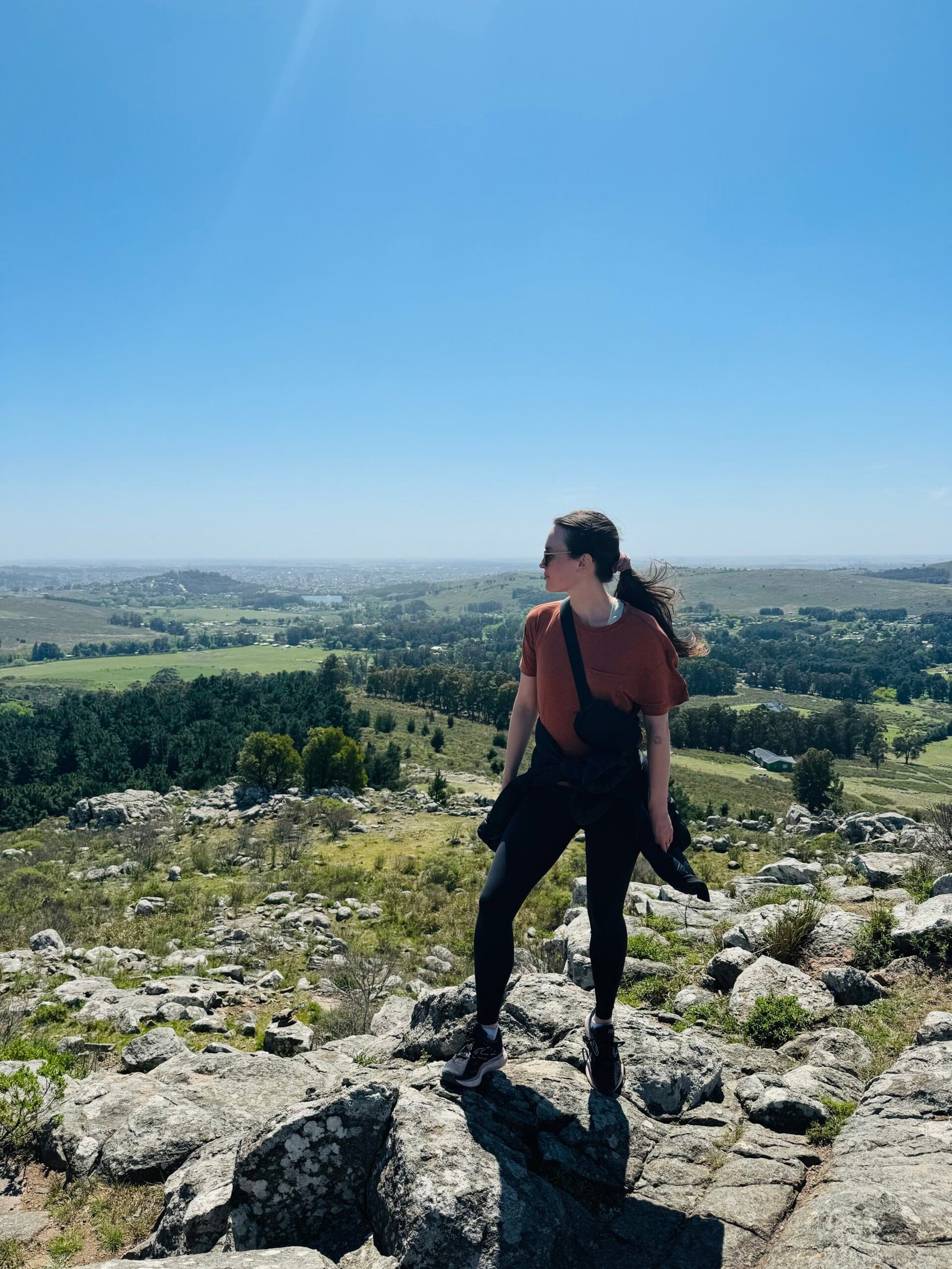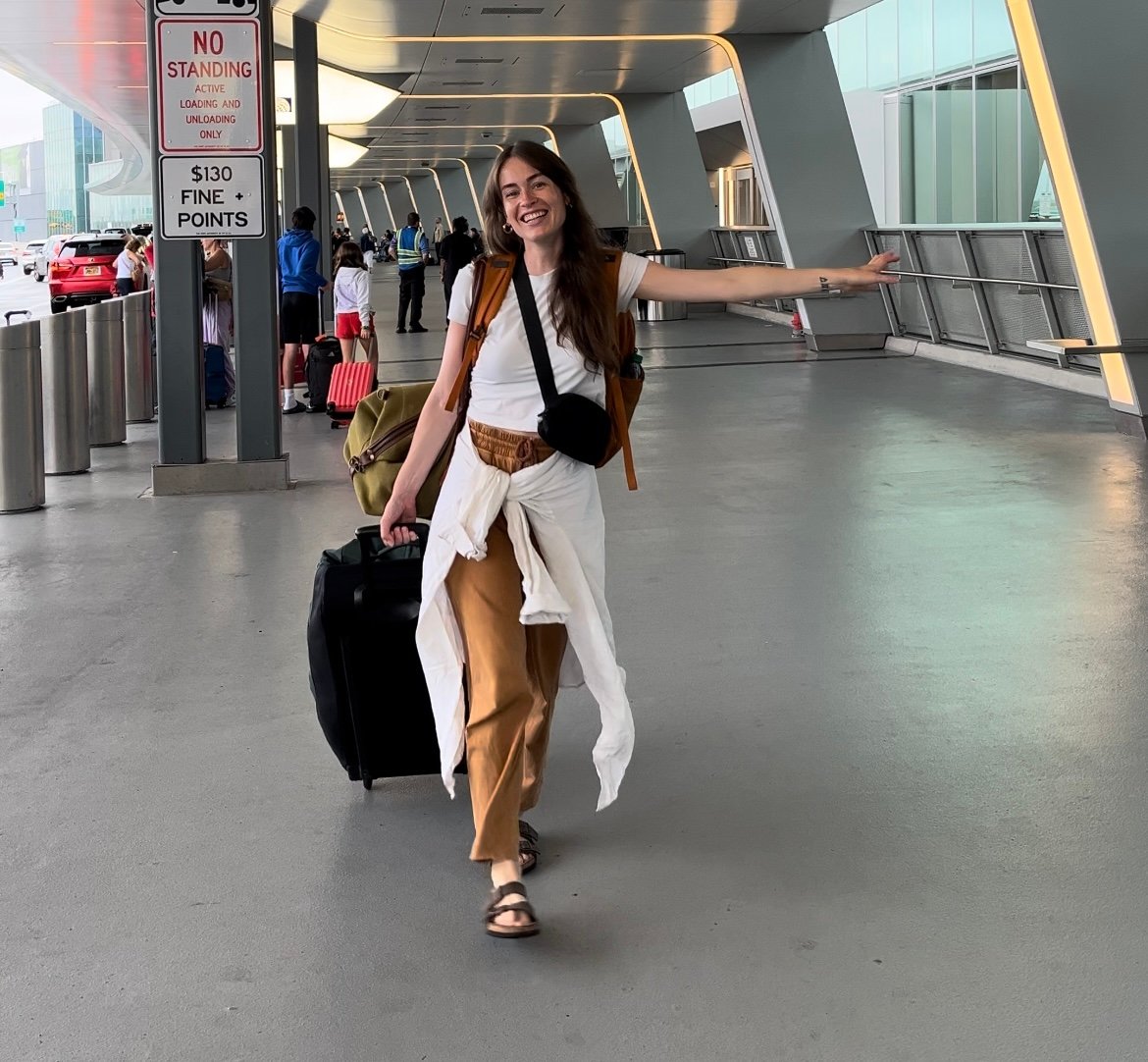Learning Spanish can be a challenge, but learning Porteño Spanish — the distinct dialect spoken in Buenos Aires — is a whole new adventure. Buenos Aires isn’t just any Spanish-speaking city; its language is infused with Italian influences, colorful slang known as lunfardo, and a unique accent that stands out across the Spanish-speaking world. (Sha…. 🤌)
When I first arrived here in 2018, I was armed with a basic level of Spanish that I thought would serve me well. But, let me tell you, nothing could have prepared me for the whirlwind that is Buenos Aires. I remember standing in line at a café, trying to order a simple medialuna and coffee, and feeling completely lost when the barista threw in some slang I’d never heard before. It wasn’t just the words — it was the accent, the speed, and the use of this word “vos” that I’d never seen in a textbook.
To make matters even more overwhelming, I had just fallen in love with an Argentine who was inviting me to all of his friends’ asados and family dinners… in Spanish, of course. I quickly realized that if I wanted to connect with locals and immerse myself in this incredible city, I’d have to learn how to speak like a local.
Seven years later, I lived to tell the tale — and now, I’m bringing my tips and tricks to you!
If you’re headed to Buenos Aires, read on for my top recommendations for learning Porteño Spanish.
Do you need to know Spanish to visit Buenos Aires?
I know what you’re thinking…
“Can I get away with only speaking English?”
No — for a few reasons.
In the popular tourist neighborhoods within Buenos Aires, you’ll find that a lot of locals do speak English. However, outside of these areas and in the interior of the country, it’s less common.
Additionally, while you can rely on your English on certain occasions, it’s helpful to have at least a base in the Spanish language before you travel here. You’ll want to feel comfortable managing tasks like asking for directions, ordering food, introducing yourself, and asking for help.
And beyond just your ease of life, learning the local language is key to understanding a new culture and connecting with its residents. It’s a sign of respect to show that you’re trying to assimilate.
This doesn’t mean you should be fluent; I was far from fluent when I arrived. In fact, I’m going to let you in on a little secret: I actually majored in Spanish for my undergraduate degree and somehow graduated with next-to-no ability to actually speak Spanish. I’d like to think it’s the fault of my country’s education system… but, if I’m being honest, I just struggle to learn languages! It doesn’t come naturally to me.
After plenty of practice here in Argentina and many, many mistakes, I was finally able to put that Spanish degree to use. As they say, the best way to learn Spanish is to live in a Spanish-speaking country.
So, if you’re feeling overwhelmed by the idea of navigating a country in a foreign language, please know that you’re not alone — and you’re fully capable of making it work! If I could do it, you can do it. In no time, you’ll feel like a Spanish-speaking pro.
For now, let’s review a few key points that will help you with your Porteño Spanish.
The accent
Argentines speak Spanish, but… you might notice something sounds off when you arrive. It’s the accent!
Different regions of Argentina have different accents, but the one you’ll be hearing in Buenos Aires is known as “español rioplatense.”
The most prominent difference between español rioplatense and other Spanish dialects is the pronunciation of the “ll”. In Buenos Aires, it’s pronounced “sh” instead of “y” (trust me, you’ll get used to it).
Also, español rioplatense tends to cut the final “s” off of words. For example, “nos vamos” becomes “no vamo.”
And when it comes to conjugations, español rioplatense uses a different (but similar) conjugation for the “you” form. You simply change the “r” at the end of the verb to an “s” and place an accent on the last syllable. For example:
- Tú hablas → Vos hablás (You speak)
- Tú vienes → Vos venís (You come)
- Tú puedes → Vos podés (You can)
In my opinion, it’s actually easier because there are no irregular verbs in the “you” form.
Oh, and instead of “tú”… they say “vos.”
Words & phrases to know before you arrive
- “Che” = a common interjection to get someone’s attention, similar to “hey”
- “Boludo” = pal, friend, dude
- “Pibe/a” = boy, girl
- “Mango” = Argentine pesos
- “Quilombo” = chaos
- “Laburo” = job
- “Mina” = a woman you don’t know
- “Pelotudo” = someone who’s stupid
- “Forro” = someone who’s very annoying or unlikeable
- “Estar al pedo” = to sit around doing nothing, lazy
- “Estar en pedo” = to be drunk
- “Ni en pedo” = no way
- “Estar a full” = to be busy, maxed out
- “Tener fiaca” = to be tired
- “Bárbaro” = amazing, great
- “Buena onda” = good vibes
- “CABA” = Ciudad Autonoma de Buenos Aires, a.k.a. the city proper
Tools to improve your Spanish
Let’s get into it:
→ Practice.
Why am I putting such an obvious answer first? Because it is THE number one way to learn a language, and we don’t do it enough. I’m not talking five minutes of Duolingo every morning. No. Learning Spanish requires hours and hours of practice, daily.
And here’s the real kicker — you need to practice even when you’re tired, frustrated, or would rather slip back into the comfort of your native language. I took the biggest strides forward when I forced my Argentine partner to speak to me only in Spanish. We made this a non-negotiable rule at home. At first, it was incredibly difficult. After a long day, my brain was fried, and our conversations were stripped down to super, super simple phrases. Think: ‘What time is dinner?’ or ‘How was your day?’ Yet, those moments, when I was at my most mentally drained, are what pushed my Spanish skills forward the fastest.
Why? Because real-life conversations — no matter how basic — teach you the rhythm of the language. They force you to recall vocabulary, figure out grammar on the fly, and tune your ear to the accent. Sure, it was uncomfortable at first, but those moments of discomfort are where the magic happens. The more you practice, the more second nature it becomes, until one day you find yourself chatting in Spanish without even thinking about it.
→ Private Spanish lessons
Practicing with locals is the best way to master your fluency, but working with a Spanish teacher is the best way to master your grammar. (Insert: Confused face of my Argentine partner when I ask him: “Why did you use the pretérito pluscuamperfecto in that sentence?”)
Private lessons allow you to practice communication 1:1, personalize the material to your Spanish level, and ask any and all questions you have.
If you’re looking for a teacher, I recommend Spanish en Linea with Lara Samoilovich. She was my tutor for months, so I can attest to the efficacy of her classes. Using the code “Banoma,” you can get your first lesson for free to ensure it’s the right fit for you.
- Email: enlinea.spanish@gmail.com
- Instagram: @spanish.enlinea
- Code for free class: Banoma
If you prefer a group setting, here are some well-known schools in Buenos Aires: (Disclaimer: I’ve never tried these firsthand, but I’ve heard good reviews.)
→ Duolingo
“Wait, didn’t she just say not to use Duolingo?”
You caught me. But actually, what I mean is that while you cannot only rely on Duolingo, it’s a fantastic tool to supplement your other steps toward proficiency.
For just 5 minutes every day, you can practice your Spanish, 100% free. This is the most popular platform for online Spanish learning. The lessons are presented as games, so it’s fun and engaging. And divided up into bite-size pieces, it’s scientifically proven to work.
Keep in mind that Duolingo teaches neutral Spanish, so it’s a good idea to supplement Duolingo with an Argentine-specific teaching method (such as working with an Argentine tutor or reading Argentine novels, etc.)
→ Porteño Spanish
This app was created specifically for teaching Argentine Spanish. You’ll learn local terminology like “che” and “boludo,” how to use “vos,” and more.
→ Help! I Am Dating an Argentine
The name alone probably caught your attention. No, this isn’t a guide on dating an Argentine — but it is a guide on learning how to communicate with an Argentine! This eBook provides a 7-week study program and reading comprehension activities to help you master the local dialect.
→ Argentine podcasts:
Put on an Argentine podcast when you’re in the car, working out, cleaning your house, you name it! This is such an easy way to immerse yourself in the language, even if you don’t understand all of the words. Plus, Argentine podcasts will expose you to the local accent and dialect before you even arrive here.
Here are a few of my favorites:
- La Cruda: Migue Granados interviews different guests with unique life stories to understand “the raw” side of life and the human experience.
- Psicologia al Desnudo: Clinical Psychologist Marina Mammoliti dives into the depths of the mind with different psychology topics.
- Correo No Deseado: Malena Guinzburg and Connie Ballarini read (and laugh about) all the love letters, emails, and notes they’ve sent over the years — or didn’t dare to send.
→ Watch Disney channel in Spanish:
This was one of the (surprising) ways that I improved my Spanish after moving to Buenos Aires. I found that with the slower pace of speech and animated acting style, I could follow the plot without fully understanding the language. Piece by piece, I started matching the actions to the words.
If you prefer something less… cheesy, here are some Argentine classics to binge:
- “El Secreto de sus Ojos”: A must-watch Argentine film that won an Oscar. Its dialogue is rich in Argentine culture and language.
- “Casados con Hijos”: An Argentine version of “Married… with Children” that’s filled with local humor and Lunfardo.
- “Violetta”: A popular telenovela that can help you with more conversational Spanish, especially if you’re just starting out.
And remember… enjoy the process
At the end of the day, learning Porteño Spanish is not just about getting the grammar and vocabulary right; it’s about embracing the rhythm and culture of Buenos Aires. Be playful with the language. Even if you mess up (which you will!), the more you laugh it off, the quicker you’ll learn.
And, no one cares if you make a mistake. Let me repeat that because it’s very important: No one cares if you make a mistake!
Our own insecurity is often what holds us back from learning a language. We don’t want to conjugate a verb incorrectly or use the wrong article in front of a noun… the list goes on. I know — because I was once in your shoes. It was when I finally realized how much people wanted to help me, not laugh at me, that something clicked in my brain. Oh, they actually love that I’m trying to learn their language. From there, I could feel myself taking great strides with every fumbled conversation and learning opportunity.
Keep pushing through, even on the tough days. Before you know it, you’ll find yourself not just speaking Spanish but feeling it, living it. And that’s when you’ll know: You’ve become a true part of Buenos Aires.
For even more tips and insight on becoming a digital nomad in the best city in the world, follow my adventures on Instagram at @ba.noma.



